8 june 2019
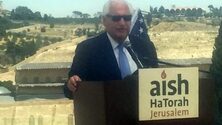
David Friedman, the current U.S. Ambassador to Israel and former Trump bankruptcy attorney, stated Saturday that he thinks Israel has a right to take over the Palestinian territory of the West Bank – despite international law which prohibits land annexation through military force.
In an interview with the New York Times, Friedman stated, “Under certain circumstances, I think Israel has the right to retain some, but unlikely all, of the West Bank”.
The West Bank refers to the area west of the Jordan River which Israel occupied by military force in 1967 and has retained military control over since that time. It is one of two Palestinian areas under Israeli military occupation – the other is the Gaza Strip. Israel has also illegally occupied the Golan Heights, which is part of Syria, since 1967.
Friedman blamed the Palestinian leadership for Israel’s ongoing military occupation of their land, claiming that the Palestinian Authority had “turned down” some “extremely generous offers” from Israel – although the only ‘offers’ that had been presented would deny Palestinians their internationally-recognized right to sovereignty, self-determination and freedom of movement.
Palestinian Authority Spokesperson Ibrahim Milham responded to the claim, saying “Friedman’s statements are a direct violation of international legitimacy resolutions and are parallel with the illegal Israeli policies. These statements prove that Friedman is the ambassador of colonization and hostility targeting the Palestinian rights, including the right to self-determination and independence.”
Milham added that, “This shows how one of the world’s biggest countries has its foreign policy determined by people who are politically immature and extremist in their ideologies, such as Kushner, Greenblatt and Friedman. These men are playing politics as if they are in a circus.”
Friedman has long been a supporter of Israeli colonial settlements, heading up the Zionist organization Friends of Bet El, which funds settlements constructed on stolen Palestinian land, while he was working as a bankruptcy lawyer prior to his appointment as Ambassador to Israel.
His ambassadorship was opposed by dozens of Jewish groups in the US, including the liberal J Street, which stated at the time, “David Friedman, President Trump’s nominee for US Ambassador to Israel, is a leading supporter of the settlement movement who lacks any diplomatic or policy credentials. He has attacked fellow Jews and public figures with hateful accusations that should disqualify him from representing our country in any capacity, never mind in one of the region’s most sensitive and important diplomatic posts.”
Dr. Hanan Ashrawi, a member of the Executive Committee of the Palestine Liberation Organization, said that, “Friedman’s statements are direct incitement against the Palestinian people, and are filled with lies that aim at justifying the Israeli crimes against the Palestinian people.”
In his interview Saturday, Friedman also stated that even if peace is achieved, the Israeli military would need to continue its military occupation of the West Bank.
Saeb Erekat, the chief Palestinian negotiator, said this would constitute an “annexation of occupied territory, which is a war crime according to international law.”
In an interview with the New York Times, Friedman stated, “Under certain circumstances, I think Israel has the right to retain some, but unlikely all, of the West Bank”.
The West Bank refers to the area west of the Jordan River which Israel occupied by military force in 1967 and has retained military control over since that time. It is one of two Palestinian areas under Israeli military occupation – the other is the Gaza Strip. Israel has also illegally occupied the Golan Heights, which is part of Syria, since 1967.
Friedman blamed the Palestinian leadership for Israel’s ongoing military occupation of their land, claiming that the Palestinian Authority had “turned down” some “extremely generous offers” from Israel – although the only ‘offers’ that had been presented would deny Palestinians their internationally-recognized right to sovereignty, self-determination and freedom of movement.
Palestinian Authority Spokesperson Ibrahim Milham responded to the claim, saying “Friedman’s statements are a direct violation of international legitimacy resolutions and are parallel with the illegal Israeli policies. These statements prove that Friedman is the ambassador of colonization and hostility targeting the Palestinian rights, including the right to self-determination and independence.”
Milham added that, “This shows how one of the world’s biggest countries has its foreign policy determined by people who are politically immature and extremist in their ideologies, such as Kushner, Greenblatt and Friedman. These men are playing politics as if they are in a circus.”
Friedman has long been a supporter of Israeli colonial settlements, heading up the Zionist organization Friends of Bet El, which funds settlements constructed on stolen Palestinian land, while he was working as a bankruptcy lawyer prior to his appointment as Ambassador to Israel.
His ambassadorship was opposed by dozens of Jewish groups in the US, including the liberal J Street, which stated at the time, “David Friedman, President Trump’s nominee for US Ambassador to Israel, is a leading supporter of the settlement movement who lacks any diplomatic or policy credentials. He has attacked fellow Jews and public figures with hateful accusations that should disqualify him from representing our country in any capacity, never mind in one of the region’s most sensitive and important diplomatic posts.”
Dr. Hanan Ashrawi, a member of the Executive Committee of the Palestine Liberation Organization, said that, “Friedman’s statements are direct incitement against the Palestinian people, and are filled with lies that aim at justifying the Israeli crimes against the Palestinian people.”
In his interview Saturday, Friedman also stated that even if peace is achieved, the Israeli military would need to continue its military occupation of the West Bank.
Saeb Erekat, the chief Palestinian negotiator, said this would constitute an “annexation of occupied territory, which is a war crime according to international law.”
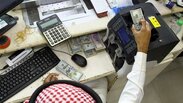
file picture, a Saudi money changer counts US banknotes at a currency exchange shop in Riyadh, Saudi Arabia
Less than a week after Saudi authorities arrested more than 60 people, including Palestinian expatriates and Saudi nationals, on charges of supporting the Palestinian Hamas resistance movement, they have now blocked money transfers between the kingdom and the Gaza Strip.
The new step taken by the Riyadh regime against Palestinians involves official and non-official money transfers as the procedure has witnessed a marked decline over the past week and during the Eid al-Fitr holiday, which marks the end of the Muslim holy fasting month of Ramadan, Arabic-language al-Khaleej Online news website reported.
The report described residents of the besieged and impoverished Gaza Strip as the main victims of the move. Most of the bank transfers that used to be carried out normally in the past, were frozen just a few days before the start of the holiday.
Remittance transactions are taking much longer time than usual – something that used to be done in a matter of few hours.
Many Palestinians have complained of the move, and termed it as “unprecedented.” They argue that the process of transferring money between Saudi Arabia and the Gaza Strip has become extraordinarily difficult.
Abu Fuad, a resident of the Gaza Strip who refused to give his last name for fear that his family could be persecuted in the Saudi Arabian port city of Jeddah, said he has experienced difficulty receiving money from his family.
“It is three days since the remittance has been made, but I have not received anything. Financial transfers used to be done in a few hours and without any obstacles in the past. But since the week before the Eid, the procedures have become complex and most of the transfers are frozen without any obvious reason,” he said.
Abu Fuad considered the measure as a “new crackdown on the Palestinian community living in Saudi Arabia,” stressing that it would aggravate their sufferings as students rely heavily on money transferred from their families living outside the kingdom.
He called upon the Palestinian Embassy in Riyadh to intervene immediately, and try to work out a quick and practical solution to the crisis, which has negatively affected the Palestinian community in Saudi Arabia.
Over the past two years, Saudi authorities have deported more than 100 Palestinians from the kingdom, mostly on charges of supporting Hamas resistance movement financially, politically or through social networking sites.
The Riyadh regime has imposed strict control over Palestinian funds in Saudi Arabia since the end of 2017.
All remittances of Palestinian expatriates are being tightly controlled, fearing that these funds could be diverted indirectly and through other countries to Hamas.
Money transfer offices are asking the Palestinians to bring forward strong arguments for conversion, and do not allow the ceiling of one’s money transfer to exceed $3,000.
Related: Saudi crown prince offered Abbas $10 billion to accept Trump's plan: Report
Less than a week after Saudi authorities arrested more than 60 people, including Palestinian expatriates and Saudi nationals, on charges of supporting the Palestinian Hamas resistance movement, they have now blocked money transfers between the kingdom and the Gaza Strip.
The new step taken by the Riyadh regime against Palestinians involves official and non-official money transfers as the procedure has witnessed a marked decline over the past week and during the Eid al-Fitr holiday, which marks the end of the Muslim holy fasting month of Ramadan, Arabic-language al-Khaleej Online news website reported.
The report described residents of the besieged and impoverished Gaza Strip as the main victims of the move. Most of the bank transfers that used to be carried out normally in the past, were frozen just a few days before the start of the holiday.
Remittance transactions are taking much longer time than usual – something that used to be done in a matter of few hours.
Many Palestinians have complained of the move, and termed it as “unprecedented.” They argue that the process of transferring money between Saudi Arabia and the Gaza Strip has become extraordinarily difficult.
Abu Fuad, a resident of the Gaza Strip who refused to give his last name for fear that his family could be persecuted in the Saudi Arabian port city of Jeddah, said he has experienced difficulty receiving money from his family.
“It is three days since the remittance has been made, but I have not received anything. Financial transfers used to be done in a few hours and without any obstacles in the past. But since the week before the Eid, the procedures have become complex and most of the transfers are frozen without any obvious reason,” he said.
Abu Fuad considered the measure as a “new crackdown on the Palestinian community living in Saudi Arabia,” stressing that it would aggravate their sufferings as students rely heavily on money transferred from their families living outside the kingdom.
He called upon the Palestinian Embassy in Riyadh to intervene immediately, and try to work out a quick and practical solution to the crisis, which has negatively affected the Palestinian community in Saudi Arabia.
Over the past two years, Saudi authorities have deported more than 100 Palestinians from the kingdom, mostly on charges of supporting Hamas resistance movement financially, politically or through social networking sites.
The Riyadh regime has imposed strict control over Palestinian funds in Saudi Arabia since the end of 2017.
All remittances of Palestinian expatriates are being tightly controlled, fearing that these funds could be diverted indirectly and through other countries to Hamas.
Money transfer offices are asking the Palestinians to bring forward strong arguments for conversion, and do not allow the ceiling of one’s money transfer to exceed $3,000.
Related: Saudi crown prince offered Abbas $10 billion to accept Trump's plan: Report
7 june 2019
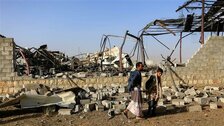
Civilians inspect the damage at a factory after an airstrike by Saudi-led coalition in the Yemeni capital Sana'a, on January 20, 2019
The administration of US President Donald Trump has reportedly permitted the construction of US high-tech bomb and missile parts in Saudi Arabia, a move that could give the kingdom the green light to ramp up the use of modern weaponry in its protracted aggression on impoverished Yemen.
According to a report published by the New York Times on Friday, the Trump administration allowed Raytheon, a US military defense contractor, to “team up” with the Saudis to build and assemble components of Paveway smart bombs in the kingdom.
The components included control systems, circuit cards and guidance electronics.
The authorization came as a result of the national emergency declaration the White House officials issued last month to bypass Congress for 22 separate arms sales to Saudi Arabia and the United Arab Emirates totaling $8.1 billion.
The United States, despite selling smart bombs and other weapons to Riyadh, has so far protected the high-tech development process “for national security reasons,” the according to the Times.
The provision, as to the American paper said, immediately "raised concerns that the Saudis could gain access to technology that would let them produce their own versions of American precision-guided bombs—weapons they have used in strikes on civilians since they began fighting a war in Yemen four years ago."
William Hartung, director of the Arms and Security Project at the Center for International Policy, warned that handing the Saudis the capacity to develop high-tech bombs could have disastrous consequences for the people of Yemen, who are already suffering from the world's worst humanitarian crisis.
"If Saudi Arabia is able to develop an indigenous bomb-making capability as a result of this deal," Hartung said, "it will undermine US leverage to prevent them from engaging in indiscriminate strikes of the kind it has carried out in Yemen."
In a detailed investigation published last month, the Times revealed that Saudi Arabia has "ordered more than 27,000 missiles worth at least $1.8 billion from Raytheon alone," and that, "about $650 million of those Raytheon orders came after the Saudi war in Yemen began."
Saudi Arabia and a number of its regional allies launched the devastating campaign against Yemen in March 2015, with the aim of bringing the former Saudi-sponsored government back to power. Riyadh has failed to fulfill its objectives.
The US along with some Western countries are complicit in the ongoing aggression as they supply the Riyadh regime with advanced weapons and military equipment as well as logistical and intelligence assistance.
According to a new report by the Armed Conflict Location and Event Data Project (ACLED), a nonprofit conflict-research organization, the Saudi-led war has so far claimed the lives of about 56,000 Yemenis.
The Saudi-led war has also taken a heavy toll on the country’s infrastructure, destroying hospitals, schools, and factories.
The UN has warned that a record 22.2 million Yemenis are in dire need of food, including 8.4 million threatened by severe hunger. According to the world body, Yemen is suffering from the worst global famine in more than 100 years.
The administration of US President Donald Trump has reportedly permitted the construction of US high-tech bomb and missile parts in Saudi Arabia, a move that could give the kingdom the green light to ramp up the use of modern weaponry in its protracted aggression on impoverished Yemen.
According to a report published by the New York Times on Friday, the Trump administration allowed Raytheon, a US military defense contractor, to “team up” with the Saudis to build and assemble components of Paveway smart bombs in the kingdom.
The components included control systems, circuit cards and guidance electronics.
The authorization came as a result of the national emergency declaration the White House officials issued last month to bypass Congress for 22 separate arms sales to Saudi Arabia and the United Arab Emirates totaling $8.1 billion.
The United States, despite selling smart bombs and other weapons to Riyadh, has so far protected the high-tech development process “for national security reasons,” the according to the Times.
The provision, as to the American paper said, immediately "raised concerns that the Saudis could gain access to technology that would let them produce their own versions of American precision-guided bombs—weapons they have used in strikes on civilians since they began fighting a war in Yemen four years ago."
William Hartung, director of the Arms and Security Project at the Center for International Policy, warned that handing the Saudis the capacity to develop high-tech bombs could have disastrous consequences for the people of Yemen, who are already suffering from the world's worst humanitarian crisis.
"If Saudi Arabia is able to develop an indigenous bomb-making capability as a result of this deal," Hartung said, "it will undermine US leverage to prevent them from engaging in indiscriminate strikes of the kind it has carried out in Yemen."
In a detailed investigation published last month, the Times revealed that Saudi Arabia has "ordered more than 27,000 missiles worth at least $1.8 billion from Raytheon alone," and that, "about $650 million of those Raytheon orders came after the Saudi war in Yemen began."
Saudi Arabia and a number of its regional allies launched the devastating campaign against Yemen in March 2015, with the aim of bringing the former Saudi-sponsored government back to power. Riyadh has failed to fulfill its objectives.
The US along with some Western countries are complicit in the ongoing aggression as they supply the Riyadh regime with advanced weapons and military equipment as well as logistical and intelligence assistance.
According to a new report by the Armed Conflict Location and Event Data Project (ACLED), a nonprofit conflict-research organization, the Saudi-led war has so far claimed the lives of about 56,000 Yemenis.
The Saudi-led war has also taken a heavy toll on the country’s infrastructure, destroying hospitals, schools, and factories.
The UN has warned that a record 22.2 million Yemenis are in dire need of food, including 8.4 million threatened by severe hunger. According to the world body, Yemen is suffering from the worst global famine in more than 100 years.
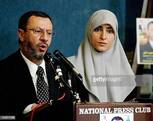
The wife of Palestinian professor Abdul-Halim al-Ashqar said that the lawyers defending her husband succeeded in extracting a court verdict ordering the US security authorities to bring him back immediately from Israel.
In press remarks to the Palestinian Information Center (PIC), Asma Muhanna stated that the court order banned the transfer of her husband to Israel, adding that Ashqar was flown back to the US from Ben Gurion airport and sent to a jail in Virginia.
A few days ago, Ashqar was kidnapped illegally by the FBI and taken aboard a plane to Ben Gurion airport in Israel in order to hand him over to the authorities there, but he was kept on the plane following a US court order.
Later, Ashqar was returned to the US aboard the same plane after a US court issued a decision in this regard.
In November 2007, the American authorities had unfairly sentenced Ashqar to 11 years in prison after placing him under house arrest for nearly two years. He wore an ankle monitor on his right leg in his home in Virginia.
He was discharged from his teaching position at Washington University in August 2004. He was subsequently arrested and accused, with no evidence, of illegally collecting funds for Hamas, and put under house arrest.
Ashqar nominated himself as an independent presidential candidate in the Palestinian election held on January 9, 2005. He was one of the 10 contenders seeking to succeed Yasser Arafat, who died on November 11, 2004 as head of the Palestinian Authority.
In press remarks to the Palestinian Information Center (PIC), Asma Muhanna stated that the court order banned the transfer of her husband to Israel, adding that Ashqar was flown back to the US from Ben Gurion airport and sent to a jail in Virginia.
A few days ago, Ashqar was kidnapped illegally by the FBI and taken aboard a plane to Ben Gurion airport in Israel in order to hand him over to the authorities there, but he was kept on the plane following a US court order.
Later, Ashqar was returned to the US aboard the same plane after a US court issued a decision in this regard.
In November 2007, the American authorities had unfairly sentenced Ashqar to 11 years in prison after placing him under house arrest for nearly two years. He wore an ankle monitor on his right leg in his home in Virginia.
He was discharged from his teaching position at Washington University in August 2004. He was subsequently arrested and accused, with no evidence, of illegally collecting funds for Hamas, and put under house arrest.
Ashqar nominated himself as an independent presidential candidate in the Palestinian election held on January 9, 2005. He was one of the 10 contenders seeking to succeed Yasser Arafat, who died on November 11, 2004 as head of the Palestinian Authority.
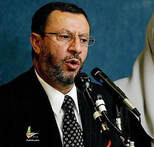
Member of Hamas’s political bureau Izzat al-Resheq has said contacts are underway with some countries to urge them to receive Palestinian scholar and professor Abdul-Halim al-Ashqar, whom the US reportedly handed over to Israel.
In Twitter remarks, Resheq said that Ashqar could be now in one of Israel’s jails or still on the US plane at Ben Gurion airport after a US judge issued a verdict calling for not removing the professor from the aircraft.
The Hamas official added that there could be a chance to send Ashqar to any country willing to receive him.
He asserted that the Hamas leadership initiated contacts with some friendly governments to urge them to intervene and discussing with them the possibility of allowing Ashqar to live in one of their countries.
Abdul-Halim al-Ashqar, originally from the northern West Bank city of Tulkarem, was a former associate professor of business at Howard University in Washington DC. He was also a former candidate who ran in the last Palestinian presidential elections held in 2005.
In November 2007, al-Ashqar was sentenced to 11 years and three months in prison for refusing to testify before a federal grand jury after he was accused of being a member of Hamas and collecting funds for it.
Washington decided to hand over Ashqar to Israel for refusing to testify against some Palestinian Muslim activists.
In Twitter remarks, Resheq said that Ashqar could be now in one of Israel’s jails or still on the US plane at Ben Gurion airport after a US judge issued a verdict calling for not removing the professor from the aircraft.
The Hamas official added that there could be a chance to send Ashqar to any country willing to receive him.
He asserted that the Hamas leadership initiated contacts with some friendly governments to urge them to intervene and discussing with them the possibility of allowing Ashqar to live in one of their countries.
Abdul-Halim al-Ashqar, originally from the northern West Bank city of Tulkarem, was a former associate professor of business at Howard University in Washington DC. He was also a former candidate who ran in the last Palestinian presidential elections held in 2005.
In November 2007, al-Ashqar was sentenced to 11 years and three months in prison for refusing to testify before a federal grand jury after he was accused of being a member of Hamas and collecting funds for it.
Washington decided to hand over Ashqar to Israel for refusing to testify against some Palestinian Muslim activists.
6 june 2019
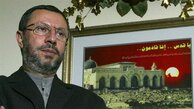
former Palestinian university professor and presidential candidate Abdelhalim al-Ashqar
US officials have handed over a former Palestinian presidential candidate and university professor to Israel after keeping him 11 years in prison on charges of racketeering and collecting funds for the Hamas resistance movement.
The Council on International Relations – Palestine, in a statement released on Thursday, denounced American authorities for extraditing Abdelhalim al-Ashqar to Israel, stressing that US officials bear full responsibility for the fate of Ashqar, who is now in the hands of the “criminal” Tel Aviv regime.
The Council noted that the move attests to the US administration’s hostility towards the Palestinian nation and stability and peace in the Middle East region as well as its blatant bias in favor of the unjust Israeli regime and its ongoing crimes.
The statement further argued that American authorities had unfairly sentenced Ashqar to 11 years in prison after placing him under house arrest for nearly two years. He wore an ankle monitor on his right leg in his home in Alexandria, Virginia.
The Council called on the international community and human rights groups around the world to press for the release of Ashqar, stressing the need for the US administration to review its Middle East policies, which run contrary to its claim of being an honest broker in the so-called peace process between the Palestinians and Israelis.
Ashqar was a professor at Howard University, Washington, the United States. Between 1998 and 1999, he was detained for several months by American officials under allegations of fundraising for certain US-based Islamic organizations.
He was discharged from his teaching position at Washington University in August 2004. He was subsequently arrested, charged with racketeering and illegally collecting funds for Hamas, and put under house arrest.
Ashqar nominated himself as an independent presidential candidate in the January 9, 2005, Palestinian election. He was one of the 10 contenders seeking to succeed Yasser Arafat, who died on November 11, 2004 as head of the Palestinian Authority.
In November 2007, he was sentenced to 135 months in prison.
US officials have handed over a former Palestinian presidential candidate and university professor to Israel after keeping him 11 years in prison on charges of racketeering and collecting funds for the Hamas resistance movement.
The Council on International Relations – Palestine, in a statement released on Thursday, denounced American authorities for extraditing Abdelhalim al-Ashqar to Israel, stressing that US officials bear full responsibility for the fate of Ashqar, who is now in the hands of the “criminal” Tel Aviv regime.
The Council noted that the move attests to the US administration’s hostility towards the Palestinian nation and stability and peace in the Middle East region as well as its blatant bias in favor of the unjust Israeli regime and its ongoing crimes.
The statement further argued that American authorities had unfairly sentenced Ashqar to 11 years in prison after placing him under house arrest for nearly two years. He wore an ankle monitor on his right leg in his home in Alexandria, Virginia.
The Council called on the international community and human rights groups around the world to press for the release of Ashqar, stressing the need for the US administration to review its Middle East policies, which run contrary to its claim of being an honest broker in the so-called peace process between the Palestinians and Israelis.
Ashqar was a professor at Howard University, Washington, the United States. Between 1998 and 1999, he was detained for several months by American officials under allegations of fundraising for certain US-based Islamic organizations.
He was discharged from his teaching position at Washington University in August 2004. He was subsequently arrested, charged with racketeering and illegally collecting funds for Hamas, and put under house arrest.
Ashqar nominated himself as an independent presidential candidate in the January 9, 2005, Palestinian election. He was one of the 10 contenders seeking to succeed Yasser Arafat, who died on November 11, 2004 as head of the Palestinian Authority.
In November 2007, he was sentenced to 135 months in prison.
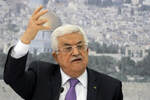
PA President Mahmoud Abbas reiterated his hopes that the US-proposed peace plan, dubbed the “Deal of the Century”, will go to Hell.
“I hope that the next Eid al-Fitr would come with us, the Palestinian people, having liberated our country from the Israeli occupation, established our independent state, with East Jerusalem as its capital, and overcome the plots contrived against the Palestinian issue, including the Deal of the Century, which will all go to Hell,” Abbas stated, according to WAFA.
Abbas said this as he visited and laid a wreath of flowers on the grave of the late president Yasser Arafat, for the Eid al-Fitr holiday, which marks the end of the fasting month of Ramadan.
He performed the Eid al-Fitr prayer at Al-Tashrifat Mosque, in the presidential headquarters in Ramallah.
US deal of the century 'will go to hell', Palestinian president says
Palestinian President Mahmoud Abbas has once again dismissed US President Donald Trump’s controversial proposal for “peace” between the Israeli regime and Palestinians, dubbed “the deal of the century,” stressing that the plan will eventually “go to hell.”
“I hope that the next Eid al-Fitr would come while the Palestinian people liberate their country from the Israeli occupation, establish their independent state, with East al-Quds (Jerusalem) as its capital, and overcome the plots contrived against the Palestinian issue, including the Deal of the Century, which will all go to hell,” Abbas stated.
He made the remarks as he laid a wreath of flowers on the grave of late Palestinian president Yasser Arafat on the occasion of Eid al-Fitr, which marks the end of the holy Muslim fasting month of Ramadan.
On Tuesday, chief Palestinian negotiator Saeb Erekat called upon Arabs to boycott the so-called deal of the century, describing his three-man team tasked with formulating the plan as “settlers.”
“Once again, I call on our Arab brothers not to talk to this group of settlers, [Trump's senior adviser and son-in-law Jared] Kushner, [US Middle East envoy Jason] Greenblatt, and [US ambassador to the occupied territories David] Friedman,” Erekat, who is also the Secretary General of the Palestine Liberation Organization, said.
He added, “What they are planning is prosperity for the settlers.”
The remarks came a day after leader of Hamas movement in the Gaza Strip stated that the US-touted Middle East peace deal is “doomed to failure.”
“On behalf of [Gaza] clans, dignitaries and elders, we declare our outright rejection of the deal of the century, and all conspiracies and forms of normalization with the Occupation and we declare a state of national alert to confront it,” Yahya Sinwar said.
“The deal of the century is doomed to failure in one way or another, and we ask the peoples of our nation from all spectra to close ranks in the face of the deal,” the Hamas chief pointed out.
On June 2, Trump acknowledged that Secretary of State Mike Pompeo’s doubts about his so-called deal of century “may be right.”
"Look, we’re doing our best to help the Middle East to get a peace plan, and he [Pompeo] may be right. I mean, most people would say that," Trump told reporters in Washington, DC.
He added, “But if we can get a Mid-East peace plan that would be good. And when Mike says that, I understand when he says that, because most people think it can’t be done. I think it probably can. But as I say often, we’ll see what happens.”
Trump’s “peace plan” has already been rejected by Palestinian authorities ahead of its unveiling at the end of Ramadan and the formation of the new Israeli cabinet.
Speaking in the occupied West Bank city of Ramallah on April 16, Palestinian Prime Minister Mohammad Shtayyeh lashed out at the initiative, asserting it was “born dead.”
Shtayyeh noted that negotiations with the US were useless in the wake of the country’s relocation of its embassy from Tel Aviv to Jerusalem al-Quds, which Palestinians consider the capital city of their future state.
“I hope that the next Eid al-Fitr would come with us, the Palestinian people, having liberated our country from the Israeli occupation, established our independent state, with East Jerusalem as its capital, and overcome the plots contrived against the Palestinian issue, including the Deal of the Century, which will all go to Hell,” Abbas stated, according to WAFA.
Abbas said this as he visited and laid a wreath of flowers on the grave of the late president Yasser Arafat, for the Eid al-Fitr holiday, which marks the end of the fasting month of Ramadan.
He performed the Eid al-Fitr prayer at Al-Tashrifat Mosque, in the presidential headquarters in Ramallah.
US deal of the century 'will go to hell', Palestinian president says
Palestinian President Mahmoud Abbas has once again dismissed US President Donald Trump’s controversial proposal for “peace” between the Israeli regime and Palestinians, dubbed “the deal of the century,” stressing that the plan will eventually “go to hell.”
“I hope that the next Eid al-Fitr would come while the Palestinian people liberate their country from the Israeli occupation, establish their independent state, with East al-Quds (Jerusalem) as its capital, and overcome the plots contrived against the Palestinian issue, including the Deal of the Century, which will all go to hell,” Abbas stated.
He made the remarks as he laid a wreath of flowers on the grave of late Palestinian president Yasser Arafat on the occasion of Eid al-Fitr, which marks the end of the holy Muslim fasting month of Ramadan.
On Tuesday, chief Palestinian negotiator Saeb Erekat called upon Arabs to boycott the so-called deal of the century, describing his three-man team tasked with formulating the plan as “settlers.”
“Once again, I call on our Arab brothers not to talk to this group of settlers, [Trump's senior adviser and son-in-law Jared] Kushner, [US Middle East envoy Jason] Greenblatt, and [US ambassador to the occupied territories David] Friedman,” Erekat, who is also the Secretary General of the Palestine Liberation Organization, said.
He added, “What they are planning is prosperity for the settlers.”
The remarks came a day after leader of Hamas movement in the Gaza Strip stated that the US-touted Middle East peace deal is “doomed to failure.”
“On behalf of [Gaza] clans, dignitaries and elders, we declare our outright rejection of the deal of the century, and all conspiracies and forms of normalization with the Occupation and we declare a state of national alert to confront it,” Yahya Sinwar said.
“The deal of the century is doomed to failure in one way or another, and we ask the peoples of our nation from all spectra to close ranks in the face of the deal,” the Hamas chief pointed out.
On June 2, Trump acknowledged that Secretary of State Mike Pompeo’s doubts about his so-called deal of century “may be right.”
"Look, we’re doing our best to help the Middle East to get a peace plan, and he [Pompeo] may be right. I mean, most people would say that," Trump told reporters in Washington, DC.
He added, “But if we can get a Mid-East peace plan that would be good. And when Mike says that, I understand when he says that, because most people think it can’t be done. I think it probably can. But as I say often, we’ll see what happens.”
Trump’s “peace plan” has already been rejected by Palestinian authorities ahead of its unveiling at the end of Ramadan and the formation of the new Israeli cabinet.
Speaking in the occupied West Bank city of Ramallah on April 16, Palestinian Prime Minister Mohammad Shtayyeh lashed out at the initiative, asserting it was “born dead.”
Shtayyeh noted that negotiations with the US were useless in the wake of the country’s relocation of its embassy from Tel Aviv to Jerusalem al-Quds, which Palestinians consider the capital city of their future state.
